Taiwan Furniture Sector Becoming Increasingly Eco-Sensitive
2008/02/22 | By Judy LiPerhaps not totally due to their willing sense of social duty to the world but more likely, at least in part, waken up by the obvious manifestations of global warming-where many parts of the world have been torn by unusually severe weather events-increasingly more makers of furnishings have been turning to look for natural materials in production to minimize their carbon footprint. The general consensus is, while the polar ice caps and icebergs continue to melt at unprecedented pace, that using natural stock to make furnishings reduces the use of electrical energy that is generated by burning fossil fuel, which then emits greenhouse gases. In other words, using plastics and many other forms of manmade composites that are produced with significant electrical energy is, hence, not ecologically sound. Plus plastics and other organic composites used in furnishings can give off hazardous substances when not disposed of properly. So the gist of it is that using natural materials such as wood minimizes furnishing makers' harmful impact on the global ecology.
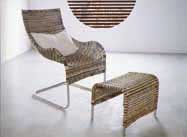
Green concerns aside, increasingly more furnishing makers realize that simply getting on the ecological bandwagon may be good for the bottom-line, maybe not in the short-term but certainly in the long-run when more consumers learn that playing individual parts will make a collective difference that could slow man's destruction of nature. Reports are that, especially in Europe and Scandinavia, consumers are drawn to green furnishings. So as more end-users consciously make themselves heard with their shopping dollars, furniture makers worldwide will be foolhardy not to listen. Meanwhile, the savvy ones are already using natural materials in production.
Young and Green
In a sense, going green today for Taiwan furniture makers is a "step backward" since all of them, during the good old days of the 1960s or earlier, were already skilled craftsmen in turning bamboo, softwoods and hardwoods into all sorts of furnishings. Although many of those craftsmen have passed on but the art of using natural materials lives on. In fact as globalization takes a broader hold of the world, more furniture makers in Taiwan have also seen the windows to their creative intellect open wider. That means some furnishing makers on the island are thinking outside the box-using not only natural materials but also unconventional ones to turn out a variety of products. One such maker is Ease Furnishings International Co. Less than a decade old, Ease Furnishings is green-minded and produces a series of ecological-sensitive furniture in Taiwan, an effort that has helped the firm to gradually build up a reputation for being eco-friendly.
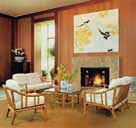
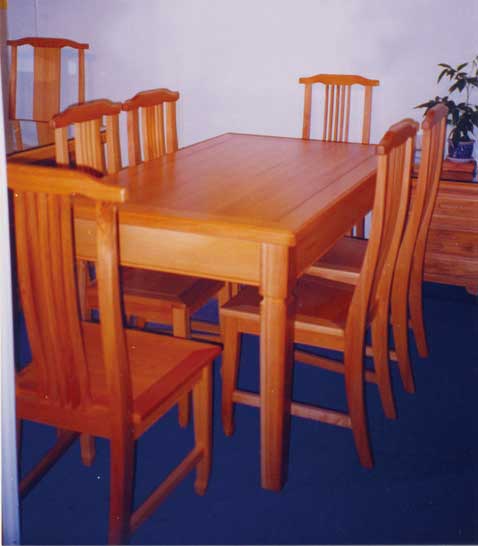
"As soon as I started to work in the industry, I have always focused on using natural materials to turn out products for my employer, resorting to bamboo, rattan, woods, stone and various weeds, a strategy that effectively enables product differentiation-setting the items that I had a part in making apart from those typical pieces of metal, glass and plastic," says Steven Chen, general manager of the company. "Before going into business for myself in the furniture sector, I worked at a famous design-oriented rattan furniture factory for about three years, whereby I learned all about manufacturing and marketing of furniture products."
Furniture of natural materials usually needs a lot of manual work and the design is very important. So, the volume of such furniture is much smaller than that of typical counterparts. "Our delicately designed natural furniture should be treasured as art objects, not because the materials of such furniture products are relatively hard to obtain, but because their designs are unique," Chen emphasizes.
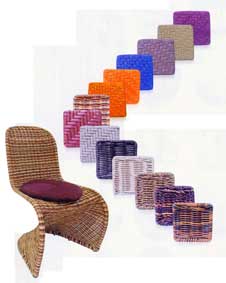
Seeing the growing market for natural furniture, Chen set up a "Cane & Bamboo Studio" about five years ago to serve the local market. "The studio usually signs contracts with clients for individual orders but offers packaged solutions," Chen says. "Most of such clients are owners or operators of hotels, restaurants, villas, amusement parks, or public spaces."
Ease Furnishings produces furniture products both at home and abroad. The company's foreign clients include international hotels and convention centers in Okinawa, Japan; Bali, Indonesia; and Geneva, Switzerland.
In addition, Ease Furnishings also counts famous temples in Taiwan among its clients. "Our design capability has won the trust of some religious groups here, mainly renowned temples that prefer Chinese-style furniture of natural materials to go with the overall flavor, mood of the temples," Chen explains.
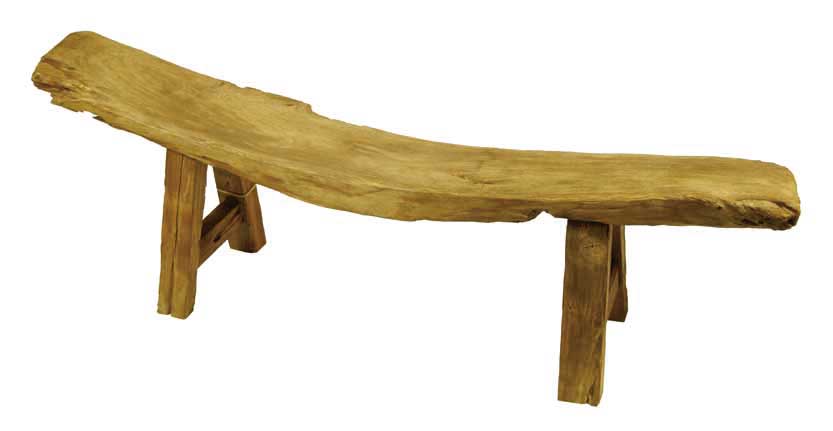
Ease Furnishings has satellite plants in Taiwan, Indonesia and China. "We work closely with our manufacturing partners and they are required to generate products that meet our standards," Chen says.
The company recently opened a furniture store in downtown Taichung City, central Taiwan, to further explore the domestic market. Moreover, it is planning to step up its effort to promote Chinese-style, eco-friendly furniture in the international market in the future.
Specialist With Cypress
Taiwan Juniper Furniture Co., located in southern Taiwan, has been a specialized furniture maker who uses mostly juniper or Chinese cypress to turn out furnishings mainly to serve local customers. "I have been involved in the manufacture of furniture products for more than two decades. In the early years I produced only juniper bathtubs that were pretty popular in the domestic market since such product became widely popular on the island at that time. However, the bathtub market had its 'plug pulled' sort to speak about nine years ago and I have since turned to producing other juniper furnishings to evade the cut-throat competition in the wooden bathtub market," frankly states Wen-yuan Tsai, founder of the company.
"The reason for backing out of producing bathtubs was due to the ever-thinning profit margins, which forced me to turn to other furniture products," Tsai explains. "Like bathtubs, the manufacture of traditional Chinese cypress furniture calls for a high degree of labor input and the manufacturing skill of this kind of furniture is long regarded as a key art in the traditional craftsman's toolbox, one that has been handed down through the generations."
"It's time-consuming, rigorous work to turn out traditional juniper furniture, so not many youngsters today are interested in joining this trade," Tsai laments. "The manufacturing skill needed to fabricate this kind of furniture is usually passed down by masters to disciples. Nowadays, it's very difficult for the master craftsmen to find willing pupils who care to roll up their sleeves, give up the comforts of a desk job, invest ample elbow grease, and toil usually without receiving any deserved gratitude. So, I have long had to deal with the problem of finding enough craftsmen to produce this kind of furniture."
Nevertheless, Tsai still insists on staying loyal to his craft because he takes pride in the work, not to mention that he thrives in knowing that his vocation helps to carry on one form of artistic culture. "These Chinese cypress furnishings are mostly handmade, ingeniously put together without nails and relying totally on joints. This is a skill requisite to turning out traditional Chinese furnishings, a painstaking and laborious art that calls for endless patience and dedication to learn and master. The regretful fact is that today not many young people have the labor-of-love and single-mindedness to be dedicated to any profession, or in this case more aptly referred to as a calling. So, I am afraid that the craft may disappear sooner or later, so I have tried my best to promote such kind of furniture," Tsai insists.
Compared to furniture made of metal, glass, plastic and other more readily-available, mundane materials, juniper furniture are usually priced much higher due mainly to the rarity of the wood and, no less significant, monumental amount of labor-intensive, careful handcraftsmanship. "Sometimes, a few pieces of juniper furnishings take months to finish," Tsai adds.
As a savvy way to overcome the rarity of raw materials, the company also uses flotsam, deadwood or discarded wood left in abandoned Chinese-style buildings. "To use second-hand or discarded materials is also recycling, which helps to reduce felling of trees and hence more eco-friendly," Tsai stresses. "Besides, this artistic juniper furniture can be passed on one generation to the next as family heirlooms, especially considering that cypress is perhaps the most durable wood, one that resists decay and insects, with the cypress tree able to live for centuries; plus the wood has a cedar-like aroma."
"Top-tier consumers are the biggest buyers of Chinese cypress furniture. So, to expand our business, we intend to explore overseas markets in the near future and Japan will be our first target," Tsai says.
30-year Veteran
With a history of more than three decades, Su-Su Furniture Corp. is a prestigious furniture manufacturer providing a wide range of furniture items, including ensembles for dining rooms, living rooms, bedrooms and studies as well as kitchens and gardening tools and accessories.
Foreseeing the world's product trend of "going green," Su-Su established an affiliate-Green Hope Corp. as early as in 1986 to generate "green" furniture products made mostly of rattan and wicker. "We have imported processed rattan and wicker from Indonesia and use such materials to fabricate sitting pads, cushions, chairs and storage cabinets," notes Joe Chao, the company's president.
To lower manufacturing cost, Su-Su started to move its production lines to China in 1990 and in the same year established a factory in Huangpu of Guangdong Province to turn out wicker and metal furniture. Five years later the company established another plant in Fuqing of Fujian Province, concentrating on the production of K/D furniture and furniture made of composite materials.
"Today we have moved all of the production lines to China and the office in Taiwan processes orders and marketing. Currently our two plants in China employ a total of near 2,000 workers and ship about 1,600 containers of furniture products a year," Chao discloses.
Of the company's total output, those made of rattan and wicker materials account for 30%-40%, which are exported mainly to Japan, the United States, Germany, France and the countries in the Middle East. "All of our furniture products made of natural materials have to go through special treatments including drying, dyeing, mold- & bacteria-preventing, etc.," Chao interprets.
"To live a natural and healthy life is gradually becoming a common concept among peoples worldwide and 'green' furniture may continue to gain growing popularity in the future," Chao predicts. To meet the world trend, Su-Su is planning to expand its operations in the green furniture sector and will develop more eco-friendly furniture in the near future.
Captivating Newcomer
Established early in 2006, In Furniture Co. is an eco-sensitive furniture manufacturer in Taiwan. "We use only natural materials to generate furniture with mostly wood, cotton, linen, rattan, bamboo, coconut fiber, and cloths. Moreover, we even use flotsam, deadwood or used materials to create special furniture items that can effectively enhance the natural, harmonious atmosphere in any space or area," comments Denny Kung, president of the company.
Most of the materials of the furniture turned out by In Furniture are sourced locally and some are imported from the countries in neighboring Southeast Asia, for instance, the teak broadly used in its furniture items is purchased from Indonesia. "We have a satellite plant in Indonesia that helps In Furniture generate furniture items and our cooperation with the plant may be enhanced if the market for such furniture keeps growing," Kung points out.
In Furniture has a strong R & D team that is led by Kung. "The company's designers usually follow the shape, the texture, and the nature of the materials they obtain to design the furniture items as naturally as they are and such items are often quite welcome among consumers in the market," Kung notes.
Despite being virtually brand-new, In Furniture has already succeeded in achieving considerable attention in the market. "I believe the market for such kind of furniture is promising and I will continue to reinforce the company's manufacturing strength in this field, hoping to provide such furniture products to the markets both at home and abroad," Chao says.




